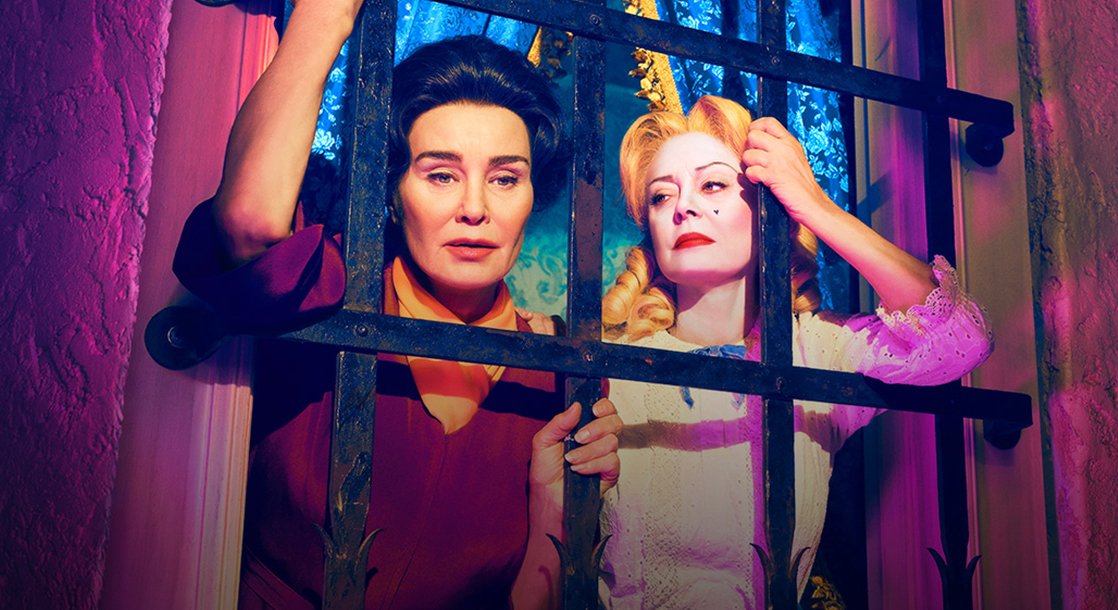Photo via FX
Every awards race has its favorites, but rarely can you say that an actor or given project is a sure thing to take home an award for their work until after the envelope is opened. With the exception of repeat winners like Julia Louis-Dreyfus (Veep) or previously Bryan Cranston (Breaking Bad, RIP), the Emmys have become increasingly difficult to predict. With the glut of prestige television, recent Emmy ceremonies have been punctuated with wins by relative unknowns like Rami Malek (Mr. Robot) and Tatiana Maslaney (Orphan Black). Despite the recent upheaval of the Emmy order, never has a performer been so completely set to cruise to TV glory than Susan Sarandon for her performance as movie star Bette Davis on FX’s Feud.
Ryan Murphy owns the Limited Series categories. In fact, he has redefined them. It used to be easy to tell apart a 22 episode TV show from an eight episode miniseries in tone, scope, and style during the era of Roots and The Thornbirds; in the old days, a “limited series” and a “series” were almost two completely different forms. Today, the lines are blurrier. All it takes is a fairly small episode order and a smart network publicist to fit your show into this category.
Murphy has used this shift to line his shelf with statues, thanks to American Horror Story and American Crime Story (on top of his earlier work with Glee and Nip/Tuck). As TV has moved towards smaller episode orders, Ryan Murphy has mastered the anthology series concept that shows like Fargo and True Detective have followed to widespread acclaim. Each season of these shows stars new actors tackling a new story, giving the consistency of a veteran show and the buzz of a brand new project. Murphy has reaped similar rewards. Jessica Lange won twice for American Horror Story; Kathy Bates won for AHS, as well. Sarah Paulson took home gold for her phenomenal performance as Marcia Clark in American Crime Story: The People Vs. O.J. Simpson. Murphy also took home a Best Limited Series Emmy for last year’s installment of American Crime Story.
Recent history points towards a Sarandon win, and so does broader Hollywood tradition. Though television is slowly getting over its film inferiority complex, the Television Academy still loves to reward film actors who come to the small screen. Sally Field won for Brothers and Sisters in 2006. Glenn Close won twice for Damages in 2007 and 2008. Viola Davis nabbed the gilded hardware for How to Get Away with Murder in 2014. These women are just the next in a long line of film actresses to win, including Meryl Streep, Maggie Smith, Helen Mirren, Halle Berry, Ellen Barkin, Holly Hunter, Jane Fonda, Lauren Linney, and even Bette Davis herself.
Hollywood also loves to reward activism, and that has already been especially true under Trump. During Oscar season, many of the nominated actors tried to frame themselves in a sociopolitical context. Some had more success (Mahershala Ali) than others (Casey Affleck) in speaking to the broader issues in society. Political moments are dominating awards shows in the Trump era. A political framing fits Sarandon naturally, as she is already an outspoken activist. It helps Sarandon's cause that Ryan Murphy is also politically active, known for his record of fighting gender inequality in Hollywood. He recently started Half, a foundation/production studio with the stated goal of bringing the abysmal percentage of women, people of color, and members of the LGBTQ community who direct TV up to at least 50 percent of any project he works on.
The strongest case for Sarandon’s inevitable Emmy win is that she gives a great performance, plain and simple. Her Bette Davis is as complex as it is bold. Many great smaller performances on TV get overshadowed come awards season, but bigger, brasher turns that manage to find nuance are exactly what the Television Academy likes. Claire Danes' unhinged CIA agent Carrie Mathison (Homeland), Uzo Aduba's Susan "Crazy Eyes" Warren (Orange is the New Black), and Tatiana Maslaney (Orphan Black) fit the description and won Emmys for their performances. Jessica Lange's work opposite Sarandon as Joan Crawford might be Sarandon's stiffest competition. Through half the season, Lange's performance is a bit less assured than Sarandon's. Though she does a nice job of nailing Joan's complicated relationship with Hollywood and the men in it, her performance sometimes gets lost lost in mimicry of Joan's accent and affectations. Sarandon never misses a beat, always ready to steal a scene by shotgun blasting acidic lines like "I'd slap you across the face if your braces didn't cost so much” at her scene partners.
As if all this wasn’t enough, Hollywood loves rewarding stories about Hollywood. The list of Oscars awarded to “movie about movies” is a mile long stretching all the way from The Artist to La La Land. There hasn’t been as much prestige TV about Hollywood over the years, but expect Hollywood’s love affair with itself to continue. The performance, the politics, the preferences of the Television Academy, and the categories themselves seem to be aligned. Sarandon had better clear out space on her awards shelf next to her Oscar—this Emmy is hers for the taking.











